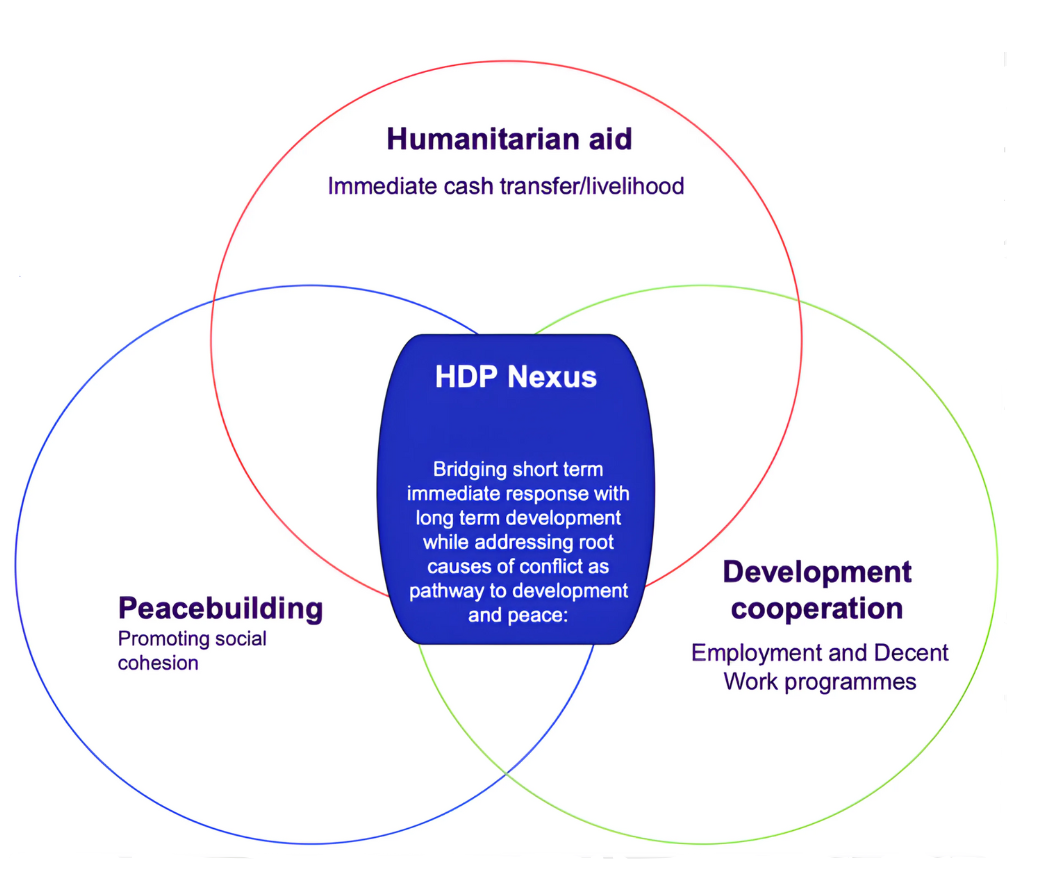A contribution to peace in the Arab States and North Africa
Linking decent work and the humanitarian-development-peace nexus
December 16, 2024

Women repair a school in Yemen, March 2020.
In a world where crises are growing more complex and protracted, especially in regions like the Arab States and North Africa, the Humanitarian-Development-Peace (HDP) Nexus is a critical framework for achieving sustainable peace and development. A central, and oftentimes overlooked component is the principle of decent work – ensuring fair employment opportunities, labour rights, and social protections for all.
In the region where over 15.8 million people are displaced due to ongoing conflict and 53.8 million people need humanitarian assistance, promoting fair and decent work through collaborative approaches can help build peace and strengthen resilience.
This is particularly evident in Iraq. At a recent workshop, Ahmed Abdul Hassan, Deputy Director General of Iraq’s Ministry of Labour, highlighted the government’s role in building sustainable peace. He urged expanding cash-for-work initiatives into national programmes. Adnan Al-Saffar from the General Federation of Iraqi Trade Unions supported this call, stressing the need for unified efforts to achieve decent work in the region.
The HDP Nexus connects humanitarian, development, and peacebuilding efforts, recognizing that lasting development solutions are essential to addressing the root causes of vulnerability. By emphasizing decent work, nexus approaches lay the foundation for economic empowerment and social stability, helping move affected populations away from fragility.

The framework encourages collaboration amongst governments, employers, and workers’ organizations to implement solutions that support livelihoods and strengthen social cohesion. Embedding decent work principles, such as fair wages, safe working conditions, and social protections, into crisis responses helps stabilize communities and reduces the risk of conflict resurgence.
Recognizing the pivotal role of nexus approaches in advancing decent work in fragile contexts, UNDP, through the Nexus Campus of its Crisis Academy, partnered with the International Labour Organization (ILO) to bring together regional policymakers for a workshop focused on integrating nexus approaches with decent work principles. Through this collaboration, UNDP encouraged the ILO to adhere to the OECD DAC-UN recommendation on the HDP Nexus. This partnership underscored the critical importance of combining UNDP's expertise in nexus approaches with ILO’s commitment to decent work.
The collaboration enabled key actors in the region to develop plans based on practical insights and lessons. In Jordan, this meant developing cash-for-work initiatives, such as business incubators, vocational training, entrepreneurship loans, and the Employment Intensive Investment Program for public works. In Yemen, a Multi-Partner Trust Fund provided innovative ways to promote decent work initiatives in a highly volatile context.
The Nexus Campus is part of UNDP’s Crisis Academy and is supported by the governments of Germany, Republic of Korea and Spain. Its initiatives emphasize a hands-on approach to capacity building and learning for UN personnel and its partners. By connecting humanitarian assistance, development goals, and peacebuilding efforts, these trainings equip professionals from across sectors to foster more effective collaboration in crisis contexts.

 Locations
Locations




